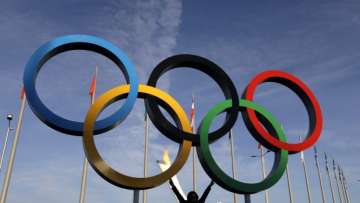IOC rules out blanket ban on Russia from Rio Olympics
The International Olympic Committee (IOC) today arrived on the decision that entry of Russian sportspersons into next month's Olympics will be up to individual sports federations. The decision of ruling out a blanket ban on

The International Olympic Committee (IOC) today arrived on the decision that entry of Russian sportspersons into next month's Olympics will be up to individual sports federations.
The decision of ruling out a blanket ban on the country's Olympic body ROC came after IOC President Thomas Bach and the other 14 executive board members met today to further study the question of the participation of Russian athletes in the Rio 2016.
"Entry will be accepted by the IOC only if an athlete is able to provide evidence to the full satisfaction of his or her International Federation (IF)," IOC said in a statement after a meeting of its Executive Board.
"The IFs should carry out an individual analysis of each athlete’s anti-doping record, taking into account only reliable adequate international tests, and the specificities of the athlete’s sport and its rules, in order to ensure a level playing field," it added.
The International Association of Athletics Federations' (IAAF) has suspended the Russian athletics body and also turned down the applications of 68 athletes, barring long jumper Darya Klishina.
The IOC verdict comes after World Anti-Doping Agency (WADA)'s Independent Commission urged a ban on Russian athletes from all international sports competitions.
The WADA committee had given its suggestion following its findings that Russia’s Sports Ministry and the Center for the Training of Russian National Teams and the Federal Security Service supported the doping programme in the country's sports from late 2011 to August 2015.
One of IOC's criteria also states that: "The IFs to examine the information contained in the Independent Person (IP) Report, and for such purpose seek from World Anti-Doping Agency (WADA) the names of athletes and National Federations (NFs) implicated. Nobody implicated, be it an athlete, an official, or an NF, may be accepted for entry or accreditation for the Olympic Games.
The IFs will also have to apply their respective rules in relation to the sanctioning of entire NFs.
Furthermore, the IOC said in its official statement, "The ROC is not allowed to enter any athlete for the Rio 2016 who has ever been sanctioned for doping, even if he or she has served the sanction.
"The entry of any Russian athlete ultimately accepted by the IOC will be subject to a rigorous additinoal out-of-competition testing programme in coordination with the relevant IF and WADA. Any non-availability for this programme will lead to the immediate withdrawal of the accreditation by the IOC," the statement added.
Competitors from Russia who want to take part in the Games will have to meet strict criteria laid down by the IOC.
Russia welcomed the IOC's decision. "We are thankful to the IOC for allowing Russian athletes to compete at the Rio Olympics," Tass quoted Russian Minister of Sports Vitaly Mutko as saying.
"I am sure most of the members of the Russian team can meet the IOC criteria."
The minister went on to say that the decision to ban Russian athletes who has even been sanctioned for doping from the Rio 2016 Olympics is fair, reports Tass.
"It is fair to ban from the Olympics those Russian athletes who have been sanctioned for doping abuses," he told journalists.
The IOC also confirmed it will not allow whistle-blower Yulia Stepanova to compete as a neutral athlete in Rio.
IOC, however, warned that additional sanctions and measures may be imposed following the final report of the IP and due legal procedure by the IOC Disciplinary Commission.
The IOC earlier had said it needed to seek out legal path to a collective ban after the Court of Arbitration for Sport (CAS) on Thursday rejected the appeal by Russian track and field federation and 67 athletes against their Olympic exclusion.
The key issue was whether the extent of the cheating in Russia gave the IOC grounds to punish athletes with no positive drug tests on their record.
If the IOC banned Russia from Rio, it would be the first time a country had been excluded since 1988, when South Africa's IOC suspension over apartheid was in force.
(With IANS inputs)